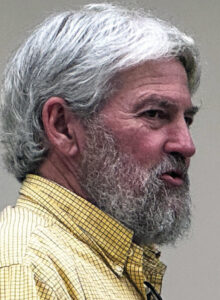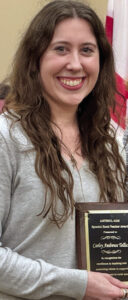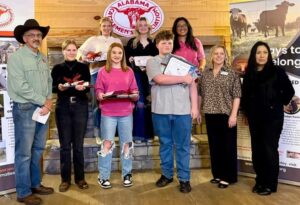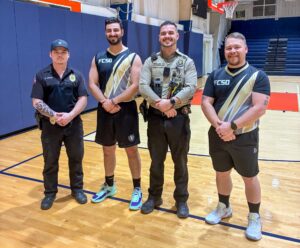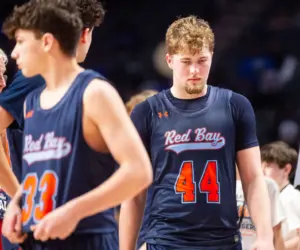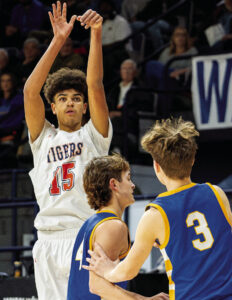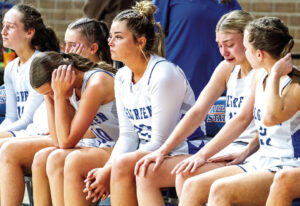Progress 2022: What is Distinguished Young Women?
If ever there was an expert on the Distinguished Young Women of Franklin County, it would have to be Dr. Susan Hargett. After all, the Belgreen native has been coordinating the local program, coaxing high school girls to pursue their highest potential, since the mid-1980s.
“My job is teenage girl whisperer,” Hargett said jokingly. She puts her all into encouraging and motivating local girls into participating in the DYW program. “It’s almost like a ministry. We’re changing lives, one at a time.”
Prior to Hargett’s taking charge, she said Franklin County didn’t have a formal competition, as such; rather, local competitors entered the state competition at-large. “If you don’t have a program in your county, you go down and compete at large, and there’s still lots of counties that do that,” Hargett explained. “A lot of counties don’t have a program – and nobody has a program as good as us.”
When Hargett was first recruited by state coordinators to lead local programming, she sent at-large Franklin Countian Jamie McBrayer to state in 1986. “I knew she was valedictorian of her class – super talented and very smart,” Hargett said. The following year, with Hargett’s initiative, an official county competition began in 1987. Held at Belgreen High School, the new local program named Michelle Davis as its first winner, and participation each year began to include more girls from across the county – whereas prior to the local competition being established, primarily Russellville girls had represented the county in an at-large capacity.
Of course, DYW has its roots in the Junior Miss program. According to program history, Junior Miss started as a local competition based in Mobile, originally called Azalearama. When girls from across state lines started signing up to participate, sponsors opened it up to high school girls from every state and renamed it the Junior Miss America Pageant in 1957, with a slight change to America’s Junior Miss in 1959.
By the early 1960s, every state in the nation boasted a Junior Miss program, with the state winners converging in Mobile for the national competition.
Aside from a brief flirtation with the name America’s Young Woman of the Year in the ’80s, the program continued as Junior Miss until 2010, when it was rebranded as Distinguished Young Women – a title Hargett said represents, at least in part, the program’s effort to distance itself from the idea of a beauty pageant, as Junior Miss/DYW has always been a merit-based scholarship program rather than a pageant.
“They wanted to remove everything that screamed pageant,” Hargett said. You won’t find tiaras or bathing suit competitions among Distinguished Young Women. “It’s always been said, it’s more like ‘the girl next door,’” – that is, the smart, well spoken, talented, fit and poised girl next door. “It’s not somebody who’s trying to be beautiful; it’s more about the girl who is beautiful on the inside.”
That’s a focus that is illustrated in the components of DYW. Competitors are judged and scored based on the same criteria at the local, state and national levels:
- Scholastics, 25 percent – A panel of qualified individuals familiar with high school transcripts evaluates the participant’s high school academic record and test scores.
- Interview, 25 percent – Judges note each girl’s personality, ability to relate to others, maturity and ability to express her thoughts during a 10-minute personal interview.
- Talent, 20 percent – Each contestant presents a 90-second performing arts presentation on stage in front of an audience. Judges award points for technical ability, appropriateness of selection, stage presence and execution.
- Fitness, 15 percent – During a choreographed group routine, judges evaluate each girl’s physical stamina, coordination, agility and flexibility.
- Self expression, 15 percent – Judges evaluate the participant’s grace, poise, demeanor, carriage, posture and speaking ability as she moves about the stage and speaks on a provided topic.
In 1994-1995, Franklin County combined its program with those in Lauderdale and Colbert counties. It all started when Hargett got a call from the state coordinators.
“They said, ‘The Jaycees have given up the program in Florence, and there’s not anybody to take it. Would you take it?’” With her hands full in Franklin County, Hargett knew there was no way she could take on an additional county program. “I said, ‘Here’s the deal: If I can do Franklin, Colbert and Lauderdale together, I’ll take it, but we have to have a winner from each county” – a Hargett mandate that ended the previous tradition of having only one winner from either Lauderdale or Colbert, rather than one from each.
With a competition that was about to more than triple in size, Hargett had to find somewhere a little larger to host it than Belgreen. “That year we called Norton Auditorium, and we just happened to be pretty good friends with Robert Potts,” University of North Alabama president. The Hargetts’ daughter had just started college at UNA, and she had made quite an impression on Potts. “He said, ‘Is that the quality of girls you’re going to bring?’ We said, ‘Yes, sir!’ And he said, well, we’re not going to charge you anything for the auditorium. We’re going to embrace you, we’re going to do a big breakfast, we’re going to give the girls who win full scholarships.” And with that, the Northwest Alabama Distinguished Young Women program began to take shape – and continues to be held in Norton Auditorium each year. “He was a big believer in the program.”
That first year for the combined competition, Hargett said the local contest won the state award for best program. It’s an award the state doesn’t give out anymore – but she wishes they would bring it back. “That was a really big motivational thing to us.”
In 2016 Hargett joined forces with a willing co-chairperson: Katernia Cole-Coffey, the Franklin County Extension director. Although Cole-Coffey said she was hesitant at first, it was ultimately a perfect fit, as “the mission of Distinguished Young Women and the Cooperative Extension go hand in hand.” It comes down to the lifestyle and life skills the Extension encourages – many of them the very same promoted by DYW.
“We want you to be healthy, physically fit and drug-free,” Cole-Coffey said. “Be involved, serve your community. Be studious – stay in school. Be ambitious, set and achieve goals, be responsible, live by moral and ethical principles.”
In short, the focus is, as it has been for years, on encouraging each girl to “Be your best self.”
With all of that on the line, DYW is a lot of work for the girls who sign up to participate; of course, it’s also a lot of fun – a real “work hard, play hard” situation. It’s also a lot of work for Hargett, Cole-Coffey and everyone else who is part of helping pull the program together each year, whether in the spotlight or behind the scenes.
“Nobody knows the number of hours this program takes, and it’s all volunteer,” Hargett said. “We’ve had a lot of good people help with the program during the years … And Franklin County has always been very supportive – the merchants of the program, the food, and we appreciate that so much. Cities, banks, businesses – they just go over and beyond.”
“No doubt about it, Franklin County always comes through,” Cole-Coffey agreed.
One of those volunteers is Lela Ray, who has been involved in several past programs.
“It needs to be promoted, and we need the girls to participate,” said Ray. “We always have such smart young women, but there are others who probably know nothing about it, and they need to know.”
Former winners also often come back to volunteer.
For Cole-Coffey, it comes down to an opportunity to give back. “You’ve got to give back to your community, and you’ve got to do things for other people,” Cole-Coffey said. “I know someone sacrificed for me, and I need to give back and do the same in return for someone else. And this is so important for a young woman to participate in because of the scholarship opportunity. It opens doors.
“That’s why I do it.”
“Katernia and I both have a servant’s heart,” Hargett added. “We care about community, and we care about kids.” It’s the same mentality Hargett has in her role as grant writer for Franklin County Schools, securing funding for after-school programs and other needs. “We want them to know we care about them, and we’re going the extra mile for them … Not all people are made to feel special by their friends or family, so we’re changing the world one girl at a time.”
One of the Northwest Alabama program’s most recent accomplishments has been soldiering on through the pandemic. Forced to move to the Clarion Inn because of COVID-19 restrictions at UNA in August 2020, the local program continued in its annual tradition nevertheless. “We were one of the only ones that had a program in 2020,” Hargett said. “We had 15 sign up … and then we were very limited because we could only have 100 people in the audience. But we pulled it off. We gave them a program, and we were really proud of what we did with them to make them feel special.” The state program was held virtually in January 2021. When August 2021 rolled around, the local program was able to return to Norton Auditorium.
In the final analysis, Cole-Coffey and Hargett find that the girls who participate have a positive experience, making friendships and memories to last a lifetime.
“Right before they announce the winners, the girls are downstairs getting ready, and that’s when we do a little talk and have a prayer, and they start saying, ‘I don’t care if I win or not. It’s just been such a good experience,’” Hargett said. “They get so wrapped up in each other, and that’s my favorite time – them getting excited for each other.
“I just think everybody ought to consider doing it.”


